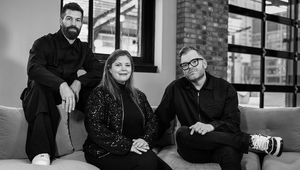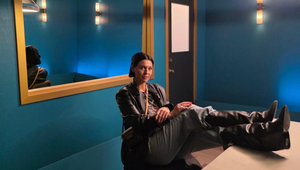
All In Musings: What AAPI Month Means to a Second Generation Korean American

Asian American and Pacific Islander (AAPI) Month will soon come to a close. As we approach the end of May it’s important to reflect on what this month has meant and what it means moving forward. As with any time of celebration and recognition, the work we do and the things we learn don’t stop simply because a month of recognition and reflection concludes.
To gain more insight into what AAPI month means to those it celebrates, and perhaps pick up a few tips on how to be a better ally moving forward, I sat down with Havas New York’s own Jessica Park.
Necko Fanning, director of DEI, Havas New York (NF)> Thanks so much for agreeing to sit down so we can learn more about you! To start off, can you tell us who you are and what you do for Havas?
Jessica Park, scheduling producer, Havas New York (JP)> I’m Jessica Park, a 2nd generation Korean American originally from Virginia and I’m currently the Scheduling Producer at Havas Studios New York. We’re a full-service global content studio and our NY team specializes in live-action and post-production.
NF> Wow, sounds like really cool work; I still struggle to crop my photos! We’ve chatted a little about some of the work you’ve done with Korean communities in the past. Could you remind me what that work entailed?
JP> Sure, prior to Havas, I was a project/production manager at AmericanStory.org, a nonprofit, a nonprofit dedicated to recording stories of Korean Americans. We produced a lot of video and audio content including oral history videos, celebrity interviews, mini docs, and even a feature film about a Korean American family that owns a dry cleaners in Queens (Happy Cleaners – check it out!).
NF> It sounds like it’d be fair to say you’ve been really engaged with Korean culture both personally and professionally. You’d mentioned before as someone of Korean descent that the work you’ve done was personally very impactful. Was being a second generation Korean American part of what made you want to get involved in that work?
JP> Definitely. I was initially attracted to this work because I wanted to learn more about my Korean American identity. My parents are first-generation Korean Americans who came to America in the 80s. They’re small business owners and very engaged with their community but I never fully understood my cultural identity or background until I studied abroad in Korea during my undergrad. Growing up in a small rural town in Virginia, I had very minimal exposure to people who looked like me. After being in Korea, I discovered a lot of new things about myself which impacted me in a big way. Some of it was as simple as finding out what colors go well with my skin tone and other parts were more profound, like finally speaking with my grandparents in their native tongue, even though it’s a language I struggle to speak myself.

NF> I can see why that would be such a transformative experience. We hear a lot about first generation immigrants and the many challenges they face but I don’t think it’s as common to hear about the challenges and opportunities second generation Korean Americans deal with. Would you be willing to tell us about some of those experiences?
JP> I think a lot of second gen kids grow up feeling kind of lost. It’s a sense of limbo really; we don’t exactly have the same life experiences as our parents, but we can’t fully relate to our schoolmate peers. I think the search for identity was much harder because of that dissonance. The search for career paths also felt narrowed to those our parents knew of (doctor, lawyer, etc.). I feel it made my own path quite windy because I was still on a deep journey to understand myself and my strengths. Ultimately, it was worth it, because now I have a solid understanding of myself. That journey really empowered me and gave me the confidence to pursue bigger dreams and fully claim my potential. That said, I still don’t think my parents understand what I do or even what kind of company Havas is. They’re just happy I seem to be doing ok!
Growing up as an immigrant kid shaped me in a lot of ways as a working adult. I’m someone who knows how to navigate difficult situations because I’ve seen what hustle looks like at my parents’ small deli; I’m someone who knows how to communicate despite language or cultural barriers; I’m someone who knows what it’s like to lack privilege, which gives me more empathy; and I’m someone who can appreciate the wealth of culture because my life was made fuller by visiting Korea and connecting with my cultural roots. I balance two worlds every day, consuming both Western and Korean content, switching languages and cultural perspectives depending on who I’m talking with, and managing the expectations of two cultures that at times have very different values.
Balancing two cultures has its ups and downs. At least I know what good Korean food tastes like (hit me up for recommendations!).
NF> I’m curious, as someone who has their foot in two worlds, so to speak, what does AAPI Heritage month mean to you? What do you think people and businesses should take away from it?
JP> AAPI Heritage month seems to grow in a different way each year, and it’s fascinating to witness fellow AAPI peers discover new parts of themselves, in the same way I did. It truly feels like you’re uncovering buried treasure that was hidden within your own unexplored identity all along. I’m always so happy to see my AAPI peers continue to discover and fall in love with their cultures and I hope that this month is a reminder to continue doing so. This month reminds me to feel proud of our growth as Asian Americans.
When it comes to businesses, I think it’s essential for companies to promote cultural spaces at the workspace, because it makes people of those cultures and demographics feel more seen and supported while also helping them connect with people at work who have similar life experiences. It’s always refreshing and exciting when those moments present themselves; it opens doors for a stronger community, for networking, mentorship, career acceleration, and personal growth.
NF> I’m always seeking new and innovative ways to be an ally to people. Can you perhaps give me a few tips on how I can be an effective ally to the AAPI community? Any tips for things to avoid?
JP> I think it’s important to remember that Asian is a huge demographic term with many rich and complex cultures falling under its umbrella. And within each of those cultures and communities there are people. We know no two people think exactly alike but, especially with Asian Americans, I feel as if we’re often lumped together, and our identity erased.
For example, I’m often asked about K-pop culture and there’s an expectation that I’m going to know every song or drama. I understand the effort and sentiment, but I won’t know them all simply because I’m Korean American. I think good allyship is remembering the joint trauma AAPI workers are going to share when acts of violence are perpetrated against us, like the recent Anti-Asian attacks, and what effects that might have on our daily work-life. Being an ally can be about simple things though, too, like maybe finding alternate ways to make sure colleagues get to express their opinions, since many Asian cultures don’t promote speaking up loudly. Simple recognition of the AAPI experience is always nice!
NF> Those are great tips! Thanks so much for sitting down to chat with me about your history and experiences. It’s been great learning more about you and your journey!
JP> Sure! Anytime.












